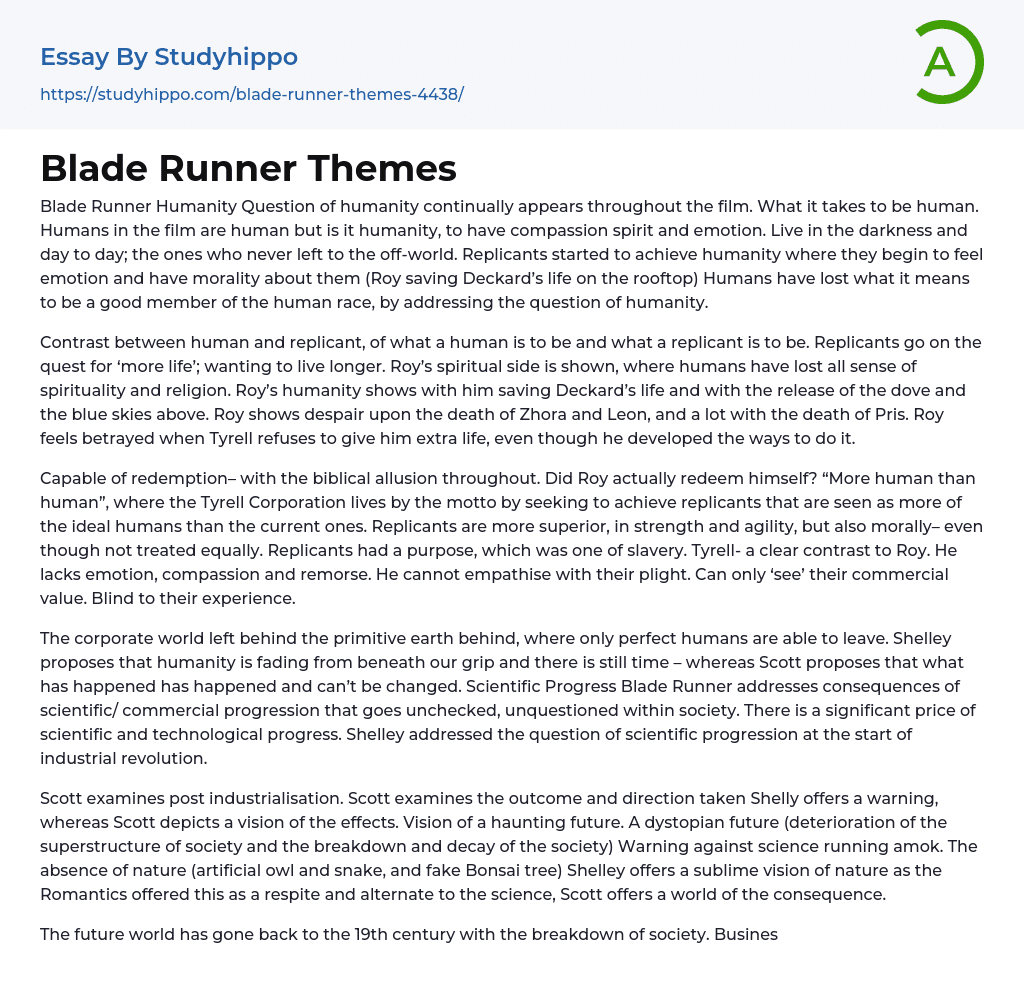Blade Runner Humanity Question of humanity continually appears throughout the film. What it takes to be human. Humans in the film are human but is it humanity, to have compassion spirit and emotion. Live in the darkness and day to day; the ones who never left to the off-world. Replicants started to achieve humanity where they begin to feel emotion and have morality about them (Roy saving Deckard’s life on the rooftop) Humans have lost what it means to be a good member of the human race, by addressing the question of humanity.
Contrast between human and replicant, of what a human is to be and what a replicant is to be. Replicants go on the quest for ‘more life’; wanting to live longer. Roy’s spiritual side is shown, where humans have lost all sense of spirituality and religion. Roy’s
...humanity shows with him saving Deckard’s life and with the release of the dove and the blue skies above. Roy shows despair upon the death of Zhora and Leon, and a lot with the death of Pris. Roy feels betrayed when Tyrell refuses to give him extra life, even though he developed the ways to do it.
Capable of redemption– with the biblical allusion throughout. Did Roy actually redeem himself? “More human than human”, where the Tyrell Corporation lives by the motto by seeking to achieve replicants that are seen as more of the ideal humans than the current ones. Replicants are more superior, in strength and agility, but also morally– even though not treated equally. Replicants had a purpose, which was one of slavery. Tyrell- a clear contrast to Roy. He lacks emotion, compassion and remorse
He cannot empathise with their plight. Can only ‘see’ their commercial value. Blind to their experience.
The corporate world left behind the primitive earth behind, where only perfect humans are able to leave. Shelley proposes that humanity is fading from beneath our grip and there is still time – whereas Scott proposes that what has happened has happened and can’t be changed. Scientific Progress Blade Runner addresses consequences of scientific/ commercial progression that goes unchecked, unquestioned within society. There is a significant price of scientific and technological progress. Shelley addressed the question of scientific progression at the start of industrial revolution.
Scott examines post industrialisation. Scott examines the outcome and direction taken Shelly offers a warning, whereas Scott depicts a vision of the effects. Vision of a haunting future. A dystopian future (deterioration of the superstructure of society and the breakdown and decay of the society) Warning against science running amok. The absence of nature (artificial owl and snake, and fake Bonsai tree) Shelley offers a sublime vision of nature as the Romantics offered this as a respite and alternate to the science, Scott offers a world of the consequence.
The future world has gone back to the 19th century with the breakdown of society. Business - “commerce”. Science entrenched in consumerism and commercial society. For Tyrell, replicants are just commerce. Given humanity of the replicants questions are raised about social priortiy (what are the needs of the society of the time, focus points of what we see humanity to be, and what is of importance to society) and moral obligations. The dystopia is a vision of a world where intellect has gone too far.
Like Shelley, Scott questions
the cost of testing boundaries of science and the ethical and moral issues associated with this. Suggestion that this is a world worth avoiding. Science has created the world, and sadly, has destroyed it too. Many advancements. However, there is still poverty, overcrowding, ill treatment, desolation. Science is a commodity in his culture. While advancements have been made, none of the problems of these advancements have been dealt with. A broken down society which simply does not work.
The film noir of the darkness of the darkness, smoke billowing from the floor and the isolation of construction areas. Inability to Accept Responsibility Blade Runner addresses ideas associated with parental responsibility. The role of the creator in the life of the created Tyrell does not “parentally” align himself with the replicants. Furthermore, insights are offered into a world where no responsibility has been taken for an obsession with science, technology and advancement. Scott shows the end result of the mistrust of responsibility here Shelly warns of what will happen with not taking responsibility.
- 12 Angry Men essays
- A beautiful mind essays
- A Separation essays
- Alfred Hitchcock essays
- American Beauty essays
- American Films essays
- Animation essays
- Avatar essays
- Blade Runner essays
- Bollywood essays
- Bond essays
- Bridge essays
- Cinema Of The United States essays
- Comedies essays
- David essays
- Dead Poets Society essays
- Do The Right Thing essays
- Documentary essays
- English-Language Films essays
- Erin Brockovich essays
- Film Analysis essays
- Film Editing essays
- Film Noir essays
- Film Techniques essays
- Finding Forrester essays
- Forrest Gump essays
- Gattaca essays
- Gladiator essays
- Glory essays
- Good Will Hunting essays
- Hamilton essays
- Hollywood essays
- Horror essays
- Jaws essays
- King kong essays
- Like Water For Chocolate essays
- Looking For Alibrandi essays
- Martin Scorsese essays
- Melodrama essays
- Monster essays
- Moulin rouge essays
- Movie Analysis essays
- Movie Review essays
- On The Waterfront essays
- One Flew Over The Cuckoo'S Nest essays
- Our day out essays
- Pearl Harbor (Movie) essays
- Persepolis essays
- Pornography essays
- Rabbit Proof Fence essays




